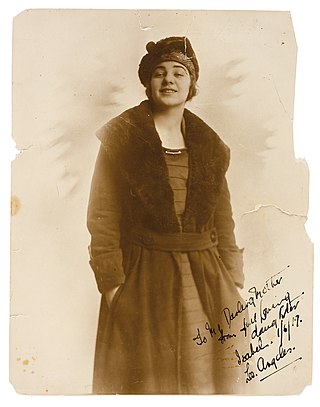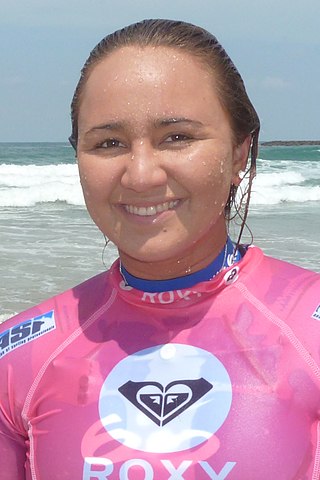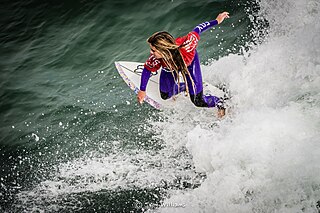Related Research Articles

Surfing is a surface water sport in which an individual, a surfer, uses a board to ride on the forward section, or face, of a moving wave of water, which usually carries the surfer towards the shore. Waves suitable for surfing are primarily found on ocean shores, but can also be found as standing waves in the open ocean, in lakes, in rivers in the form of a tidal bore, or in wave pools.

Bethany Meilani Hamilton is an American professional surfer and writer. In 2003, she survived a shark attack in which her left arm was bitten off; ultimately, she returned to professional surfing and wrote about her experiences in the 2004 autobiography, Soul Surfer: A True Story of Faith, Family, and Fighting to Get Back on the Board. The book was adapted into the 2011 feature film, Soul Surfer. Hamilton attributes her strength to her Christian faith.

Robert Kelly Slater is an American professional surfer, best known for being crowned World Surf League champion a record 11 times. Slater is widely regarded as the greatest professional surfer of all time, and holds 56 Championship Tour victories. He won the Laureus World Action Sportsperson of the Year four-times. Slater is also the oldest surfer still active on the World Surf League, winning his 8th Billabong Pipeline Masters title at age 49.

Big wave surfing is a discipline within surfing in which experienced surfers paddle into, or are towed into, waves which are at least 20 feet high, on surf boards known as "guns" or towboards. Sizes of the board needed to successfully surf these waves vary by the size of the wave as well as the technique the surfer uses to reach the wave. A larger, longer board allows a rider to paddle fast enough to catch the wave and has the advantage of being more stable, but it also limits maneuverability and surfing speed.

Surf culture includes the people, language, fashion, and lifestyle surrounding the sport of surfing. The history of surfing began with the ancient Polynesians. That initial culture directly influenced modern surfing, which began to flourish and evolve in the early 20th century, with its popularity peaking during the 1950s and 1960s. It has affected music, fashion, literature, film, art, and youth jargon in popular culture. The number of surfers throughout the world continues to increase as the culture spreads.

The World Surf League (WSL) is the governing body for professional surfers and is dedicated to showcasing the world's best talent in a variety of progressive formats. The World Surf League was originally known as the International Professional Surfing founded by Fred Hemmings and Randy Rarick in 1976. IPS created the first world circuit of pro surfing events. In 1983 the Association of Surfing Pros took over management of the world circuit. In 2013, the ASP was acquired by ZoSea, backed by Paul Speaker, Terry Hardy, and Dirk Ziff. At the start of the 2015 season, the ASP changed its name to the World Surf League. Sophie Goldschmidt was appointed as WSL CEO on 19 July 2017. Paul Speaker had stepped down as CEO on 11 January 2017, and Dirk Ziff acted as the interim WSL CEO until Goldschmidt's appointment.

Isabel Ramsay Letham was an Australian pioneer surfboard rider and swimming instructor, renowned as 'the first Australian to ride a surfboard'. A probably erroneous story has been repeated for years that on 10 January 1915 at Freshwater Beach, Sydney she experimented riding a board in the Hawaiian tradition in tandem with Duke Kahanamoku. This story has been disputed by researchers who have investigated its roots and provenance, and the reality is probably that she did not do so until shortly after, at Dee Why beach in Sydney, on 6 February 1915.

The riding of waves has likely existed since humans began swimming in the ocean. In this sense, bodysurfing is the oldest type of wave-catching. Undoubtedly ancient sailors learned how to ride wave energy on many styles of early boats. Archaeological evidence even suggests that ancient cultures of Peru surfed on reed watercraft for fishing and recreation up to five thousand years ago. However, standing up on what is now called a surfboard is a relatively recent innovation developed by the Polynesians. The influences for modern surfing can be directly traced to the surfers of pre-contact Hawaii.
Nicolás Rolando Gabaldón was an early surfer who is credited by surfing experts with being California's first documented surfer of African-American and Latino descent at a time when many beaches were segregated and opportunities for minorities more limited than today. Despite being an amateur recreational surfer rather than a professional competitive surfer, he is widely considered a role model for his part in the history of surfing and African American history in the areas of Santa Monica and California.
The registration of the "Surf City USA" trademark inflamed a historical dispute between the California coastal cities of Huntington Beach and Santa Cruz. Both cities claimed the "Surf City" nickname, but after the Huntington Beach Conference and Visitors Bureau filed three trademark applications for "Surf City USA" with the U.S. Patent and Trademark Office in 2004, a new conflict erupted, a controversy Surfer dubbed "Moniker-gate." The resulting publicity generated the equivalent of several million dollars in advertising with thousands of stories and news reports broadcast across the globe. A lawsuit was eventually settled in January 2008 which validated Huntington Beach's exclusive rights to the trademark.

Standup paddleboarding (SUP) is a water sport born from surfing with modern roots in Hawaii. Standup paddleboarders stand on boards that are floating on the water and use a paddle to propel themselves through the water. The sport was documented in a 2013 report that identified it as the outdoor sporting activity with the most first-time participants in the United States that year. Variations include flat water paddling, racing, surfing, whitewater SUP, yoga, and fishing.

Carissa Kainani Moore is a Hawaiian and American surfer. She was the first-ever winner of the Olympic gold medal in women's shortboard surfing at the 2020 Summer Olympics. She is also a five-time world champion, winning in 2011, 2013, 2015, 2019 and 2021 on the World Surf League WSL Women's World Tour. Moore was the first surfer in history to win a WSL world title and the Olympic title in the same year.

Sally Fitzgibbons is an Australian professional surfer on the Association of Surfing Professionals World Tour (2009–2013). In June 2019, she was ranked No. 1 in the world for women's surfing after winning the Rio Pro.

Laura Enever is an Australian professional surfer. Enever was the ASP Women's World Junior Champion in 2009. She made her professional debut in 2011.

Surfing in the United States is a popular hobby in coastal areas, and more recently due to the invention of wave pools, inland regions of the country. It contributes to a lifestyle and culture in which millions participate and which millions more have an interest. USA surfing is the governing body for the sport of surfing in the United States, with surf leagues such as the World Surf League available in the country. Surfing can be traced back to 17th Century Hawaii and has evolved over time into the professional sport it is today, with surfing being included for the first time in the 2020 Summer Olympics in Tokyo.

Women's surfing is thought to date back to the 17th century. One of the earliest records of women surfing is of princess Keleanohoana’api’api, also known as Kalea or the Maui Surf Riding Princess. It is rumored that Kalea was the trailblazer of surfing and could surf better than both men and women. A few centuries later in the mid-late 1800s, Thrum’s Hawaiian Annual reported that women in ancient Hawaii surfed in equal numbers and frequently better than men. Over the last 50 years, women's surfing has grown in popularity.

Justine Dupont is a French professional surfer.

Caroline Marks is an American professional surfer and the 2023 WSL Women's World Tour Champion. She is a multiple national champion and the youngest female to compete in a World Surf League event. She is the youngest surfer to qualify for the women’s Championship Tour.

Anat Lelior is an Israeli Olympic surfer. She represented Israel at the 2020 Summer Olympics, and finished 17th in the shortboard. Lelior will represent Israel at the 2024 Summer Olympics in surfing in Women's shortboard on July 27-31, 2024, in Teahupo'o reef pass, Tahiti, French Polynesia.
References
- 1 2 3 Ryan, Maggie (August 6, 2020). "This Organization Is Training Black Girls to Become Pro Surfers, 1 Wave at a Time". PopSugar . Retrieved July 15, 2024.
- 1 2 Houghton, Krista (July 20, 2021). "Black Girls Surf: Rhonda Harper". AdventureSportsJournal.com. Retrieved July 15, 2024.
- 1 2 Jean-Marie, Bryna (August 2, 2022). "Rhonda Harper Couples Social and Environmental Justice to Amplify Black Female Surfers". Sports Illustrated . Retrieved July 17, 2024.
- 1 2 3 "Activist Spotlight: Rhonda Harper & Black Girls Surf". Surfrider Foundation . June 8, 2020. Retrieved July 15, 2024.
- ↑ Varghese, Anita (September 19, 2007). "City Commemorates Ink Well Beach, First Black Surfer". SurfSantaMonica.com. Retrieved July 19, 2024.
- ↑ Simkins, J.D. (May 2, 2023). "Surfing for "Something Positive:" Black Girls Surf and the Rising Tide of Equal Representation". Sunset . Retrieved July 17, 2024.
- 1 2 Sandifer, Skyy (November 23, 2020). "Why Black Girls Surf is Making Big Waves". Complex . Retrieved July 19, 2024.
- ↑ Kempton, Jim (July 6, 2021). Women on Waves: A Culture History of Surfing-From Ancient Goddesses and Hawaiian Queens to Malibu Movie Stars and Millennial Champions. Pegaus Books. ISBN 9781643137254 . Retrieved July 17, 2024.
- ↑ Lin, Annette (April 21, 2022). "Black Girls Surf Is Making Space on the Waves". Cero Magazine. Retrieved July 19, 2024.
- ↑ Moloi, Nkgopoleng (July 22, 2021). "Meet the radical Black surf school shaping youth culture in Cape Town". Dazed . Retrieved July 20, 2024.
- ↑ "Meet the Women Making the Outdoors More Accessible to All". Condé Nast Traveler . August 10, 2020. Retrieved July 20, 2024.
- ↑ Dimond, Anna (August 7, 2022). "The Surfer Girls of Senegal". GloriousSport.com. Retrieved July 20, 2024.
- ↑ Walker, Lannie (June 12, 2020). "Black Girls Surf founder 'honored' Guam to host paddle out". The Guam Daily Post . Retrieved July 20, 2024.
- ↑ Fernandes, Deepa (January 18, 2019). "An Olympic hopeful from Senegal hopes to inspire more black women to surf". The World . Retrieved July 20, 2024.